Chet Huntley: Anchoring Big Sky Part 1
Steve McGann | Thursday Feb. 1st, 2024
Bozeman and the Gallatin Valley are beautiful landscapes. Yet, every exit from the Valley contains its own scenic delights. East over Bozeman Pass to Paradise Valley and the Absarokas, west over the Tobacco Root foothills to Homestake and Butte. But, arguably, the best route is south into the Gallatin Canyon. This canyon has always been important to Bozeman as the road to Yellowstone National Park but, beginning in the 1970s it held another attraction. Fifty years ago, Big Sky Montana, then a new western ski resort, was dedicated. The man who conceived the idea and brought it to that point had died just days earlier.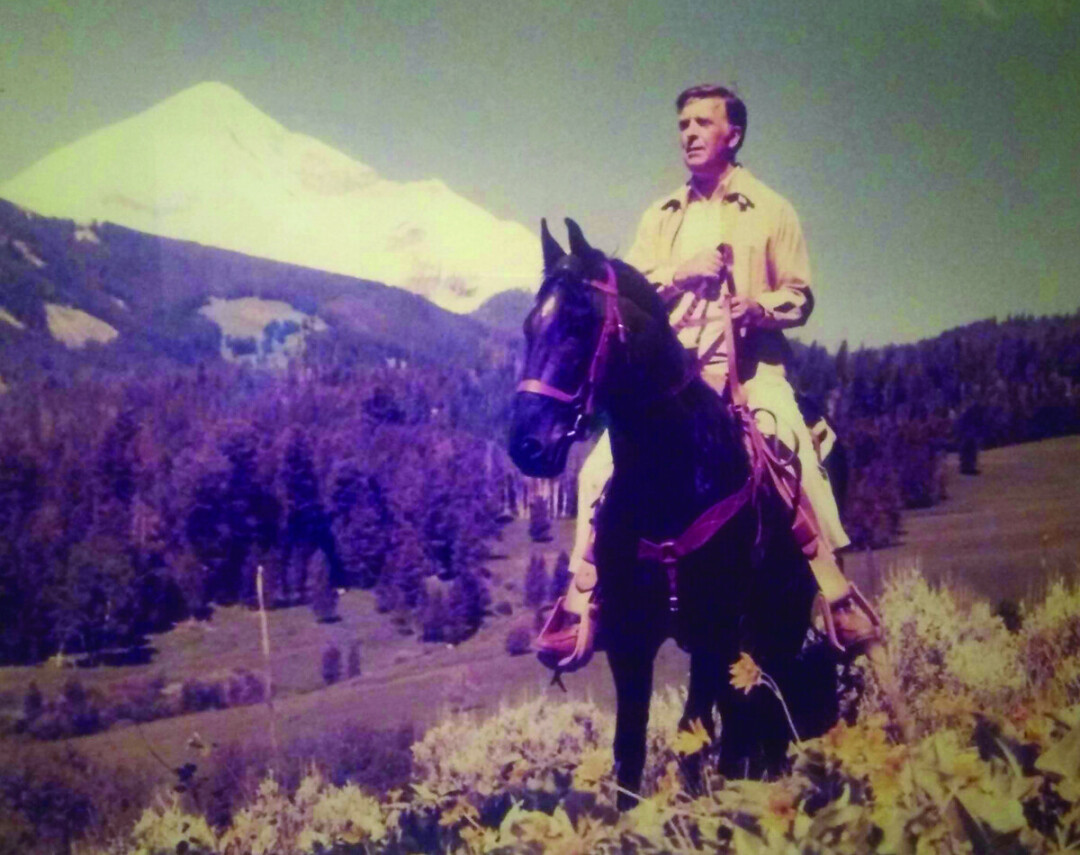
Chet Huntley was a native Montanan who had left the state as a young man and had become an instantly recognizable and respected international celebrity as a television news journalist. In researching his life and his dream, which became the resort and community of Big Sky, I relied primarily on two books: The Generous Years, a childhood memoir written by Huntley himself, and Goodnight Chet, a biography of Huntley written by Lyle Johnston. Huntley was part of that generation whose lives span the horse and wagon days, and man walking on the moon. In fact, he lived that pioneer life during his Montana boyhood, and later reported to the world the U.S. astronauts’ lunar mission from the NBC studios in New York City.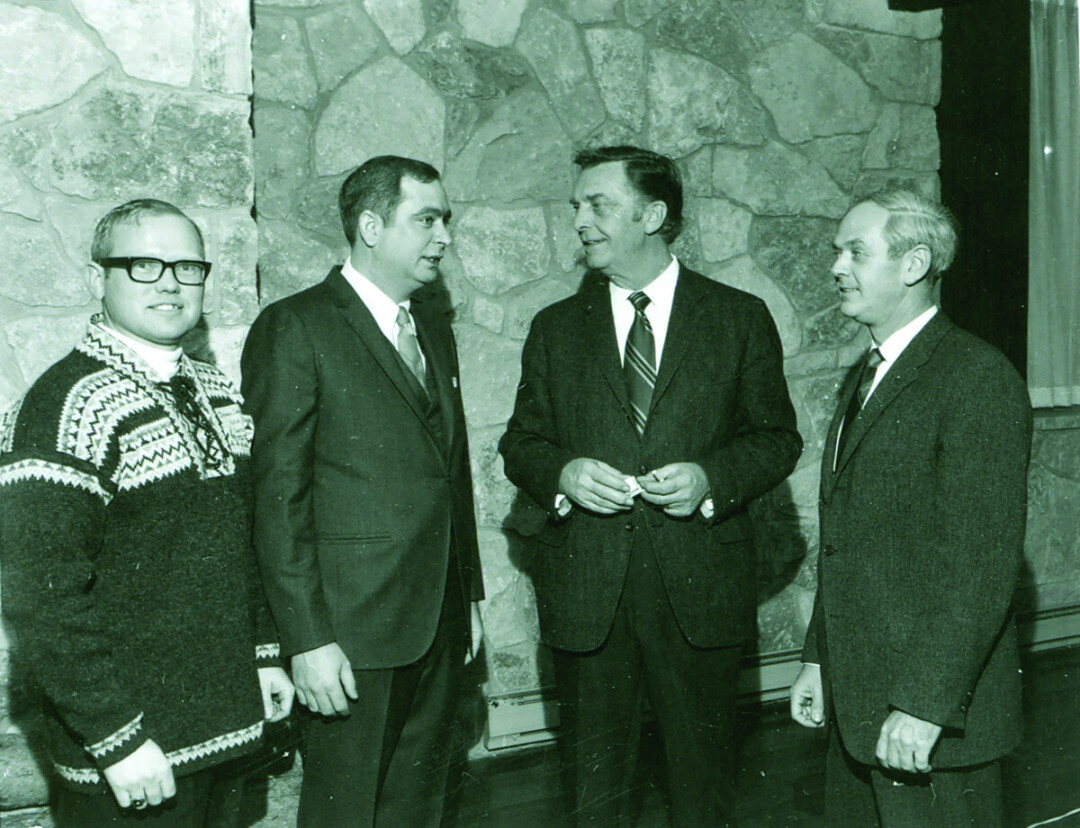
Chet Huntley (2nd from right), and unidentified companions, circa early 1970s.
Photograph courtesy of the Gallatin History Museum
Chet Huntley was born in the Northern Pacific Railroad depot in Cardwell, Montana in 1911. His father was a telegraph operator for the railroad. Two years later his father and mother, his maternal grandparents and a great aunt and uncle homesteaded 960 acres near Saco on the Hi-line. Chet describes this time of his life at the end of the frontier era with great affection. His prose beautifully depicts the hills and grasslands of that northeastern Montana land. His joy in family and land was apparent to him at a young age. He interposes his family’s experience with the history of the era of homesteading with all of its successes and failures. His idyllic boyhood, spent on the plains with his parents, grandparents, his three sisters, friends and neighbors, and his experiences in the Saco one room school, are in stark contrast to the tragedies he relates of crop destroying drought, hailstorms, and locust hordes.
Within a few years, Huntley’s father had gone back to part-time railroad employment to help support the families. By the early 1920s, the setbacks of the homesteader’s life had taken its toll. Huntley describes the lightning storm that burned their barn as not the worst, but the final incident that compelled his parents to leave the plains. His unshakable grandfather remained on the farm for a few more years, but Chet Huntley’s family, like tens of thousands of Montana homesteaders in that era, were forced to leave. His father was able to secure a full-time job with the railroad, and they moved to Willow Creek. Chet describes the train ride to their new home in great detail; he was thrilled that they were moving to the mountains which would surely have trout streams. He was nine years old.
The following several years were a blur of moves and experiences for the Huntley family. As a railroad telegrapher, Pat Huntley was assigned to work at and live in various depots in Pony, Logan, Big Timber, Norris, Whitehall, and Bozeman. Achieving seniority enabled the family to reside in Whitehall for all four years of Chet’s high school career. He was a good student, played sports, acted in class plays, and excelled in debate. After graduation, his father was able to obtain a transfer to Bozeman, where Chet enrolled at Montana State College. Two college years in Bozeman were followed by enrollment in a fine arts school in Seattle, and later, a degree from the University of Washington.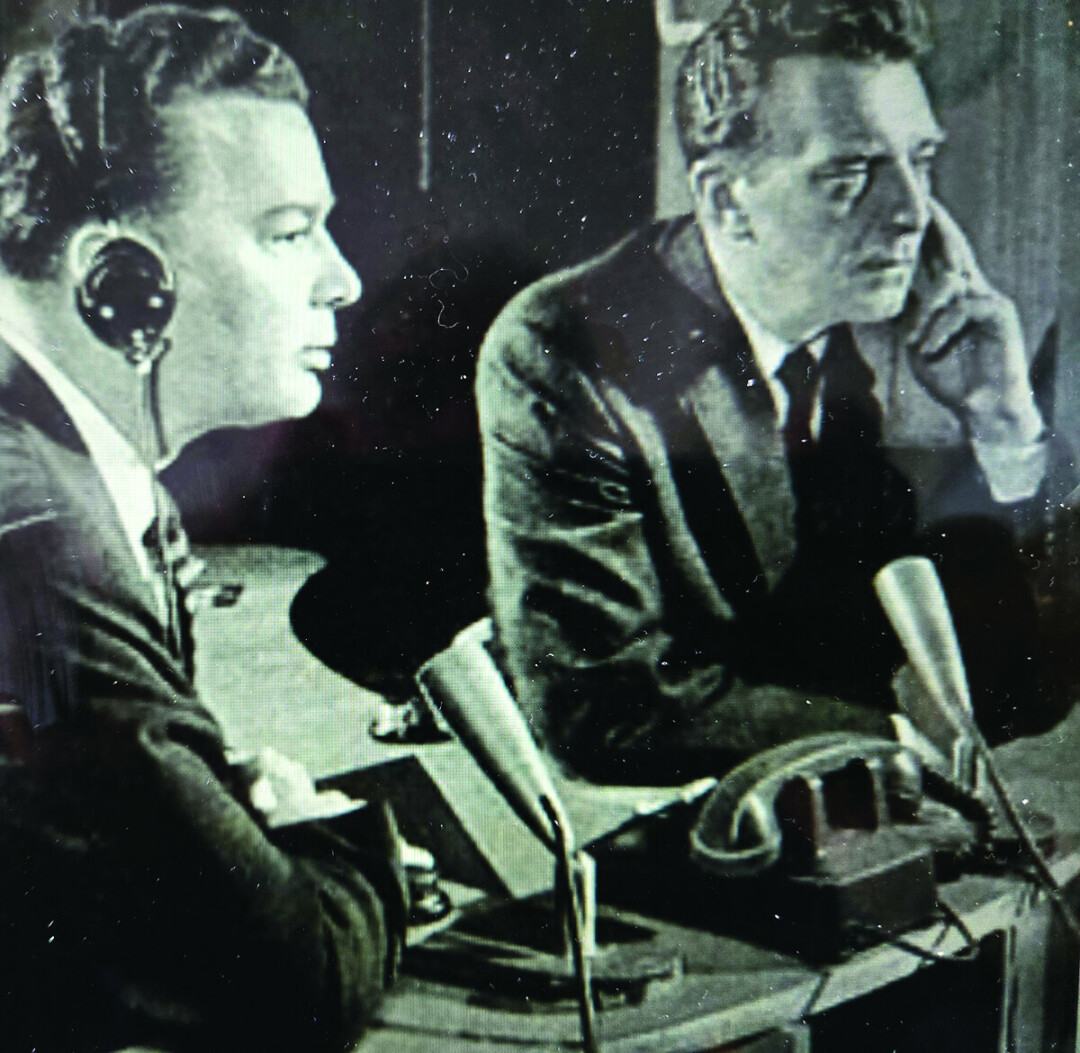
Radio was a new technology during Chet’s boyhood. His father was one of the first in each community they lived in to own one. In his memoir, he describes his father listening to broadcasts of the World Series or prize fights while Chet, hanging out of the depot window, described the action to a crowd of listeners. Having gravitated to drama and debate during his school years, and with his deep, sonorous voice, Chet Huntley was a natural for the radio business. He worked at various stations and locations in the Pacific Northwest before securing a job in Los Angeles in 1939 with the CBS network.
During his fifteen years in Southern California he covered the Pacific War and general news, and hosted programs on local happenings. In what were very unusual topics for the time, he analyzed Hispanic culture in L.A. and the early stirrings of the Civil Rights movement. He became a popular and respected regional newsman. He was one of the very few radio newscasters who had no newspaper experience. Huntley twice won Peabody awards for broadcasting excellence. He secured parts in Hollywood productions as a reporter and narrator. In 1955 he was hired by NBC News, and moved to New York City.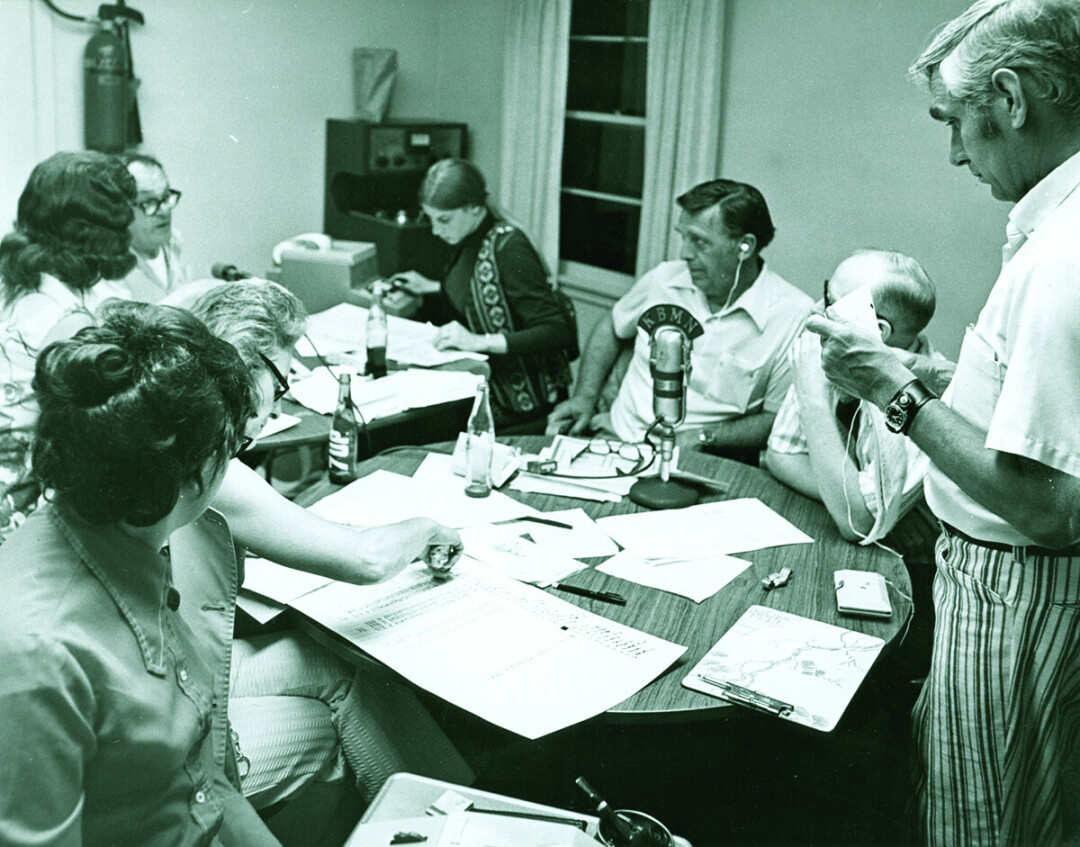
KBMN Radio Station personnel gathered around tables in the station on election night in Gallatin County, 1972.
Photograph courtesy of the Gallatin History Museum
It is difficult now for us to remember and understand the importance of the men (they were all men at the time) who were the news network anchors in the 1950s and 1960s. Today, we have dozens of cable channels with hundreds of reporters and commentators. The news is thrust at us from every device on a 24-7 schedule. The constant attention these broadcasts demand from everyone has even been deemed unhealthy.
Back in the day, there were just three national television networks: ABC, NBC, and CBS. The news was programmed each evening in a half-hour segment between 5 p.m. and 7 p.m., depending on time zones. Then as now, popularity and ratings were important for advertising money and prestige. NBC brought in Chet Huntley as a possible anchor to compete with Edward R. Murrow of CBS. Another candidate for the position was a North Carolinian named David Brinkley.
At the time, the major political party conventions were much more important than they are today. Primary elections did not determine the national candidates. This was done by party delegates at these national gatherings. Network television, in a relatively new format, covered these conventions with many hours of programming. NBC decided to use their two anchor candidates as a team at the 1956 political conventions. The chemistry and rapport of Chet Huntley and David Brinkley was immediately apparent. Later that fall, the Huntley-Brinkley Report premiered as the NBC nightly news program. The show ran for fourteen years.
Audiences were attracted to the pair; Chet the serious, straight reporter, and David the witty, somewhat sardonic commentator. Huntley broadcast from New York City and Brinkley from Washington, D.C. They won the ratings game for ten years until Walter Cronkite, who had succeeded Murrow at CBS, took the top spot. Later, Cronkite was named the most trusted person in America in a poll. Chet Huntley was second. This indicates the esteem in which these news anchors were held by the public. There is a myth that they stuck strictly to the facts without expressing opinions. The reality was that they did comment on and analyze the news they reported but without a partisan slant. Their opinions were reasonable and mainstream. The news anchors, especially Cronkite and the team of Huntley-Brinkley were looked upon as above the petty and the profane.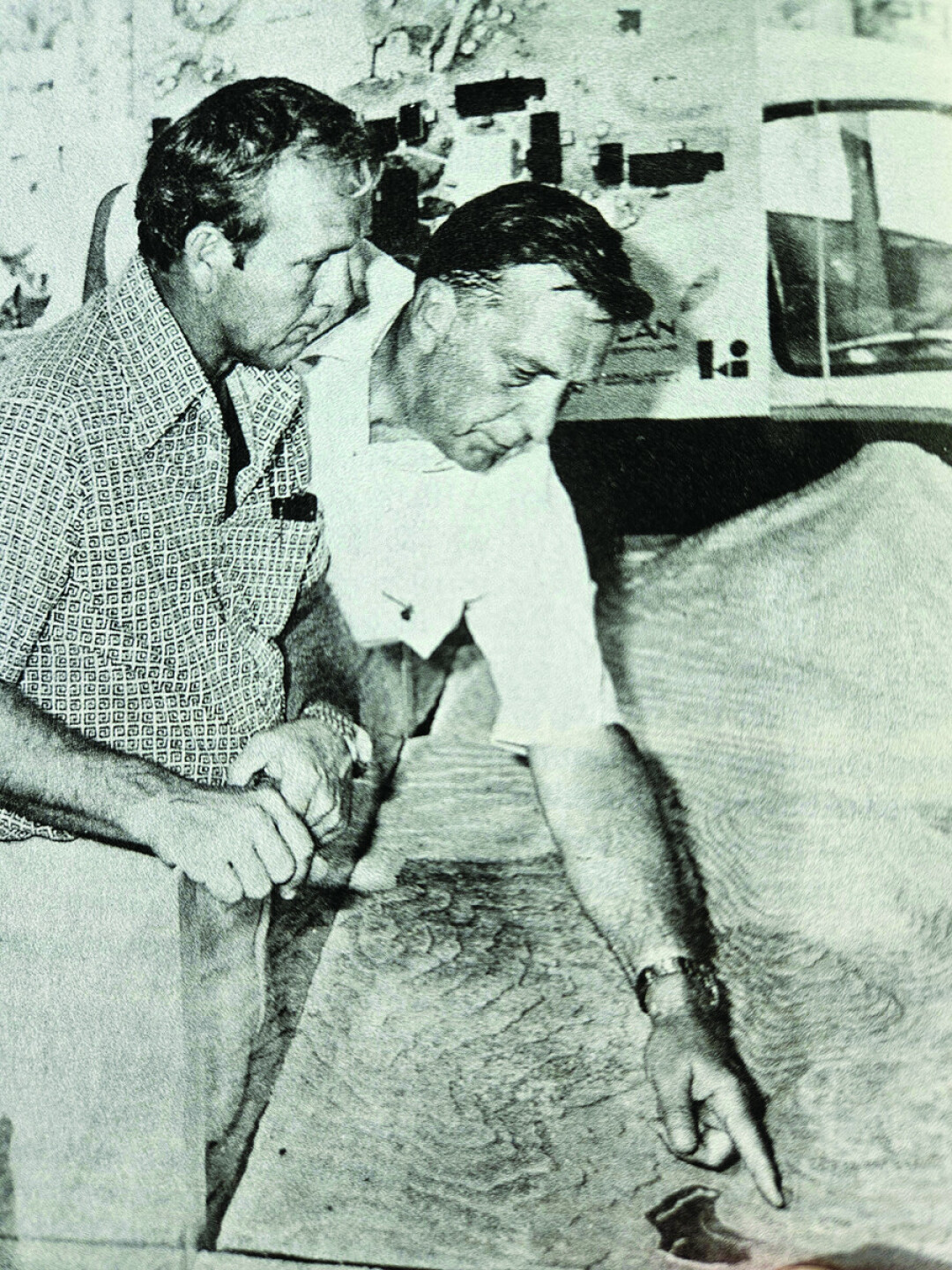
These men guided the nation through some of the most momentous and tragic events in our history; the assassinations of John F. Kennedy, Martin Luther King, and Bobby Kennedy, the Vietnam War, and the violence of the civil rights era in the 1960s. They were solidly present each evening, and the entire nation tuned in to their broadcasts.
The television audience was aware that Huntley and Brinkley were located in different cities but assumed that they, like us, could see each other on camera. This was not the case, though they could hear each other. So to prompt the other at the end of a segment, each man would say the first name of the other. This gimmick, technically necessary at the time, became commonplace in the industry. In addition, their signoff phrase at the end of each program; “Goodnight Chet, Goodnight David,” became an iconic phrase throughout the country. It was created by the producer; initially, both of them hated it. The two newsmen became so recognizable that they were found to be more well-known than most movie stars, more so than John Wayne or the Beatles.
Chet Huntley, who had for some time expressed the desire to return to Montana, retired in July, 1970. David Brinkley went on to work for NBC and later ABC for another 25 years. They had collaborated on 4500 broadcasts of the Huntley-Brinkley Report. The evening of their last broadcast together, Walter Cronkite, on their rival network, stated; “A giant departs the stage.”
| Tweet |
